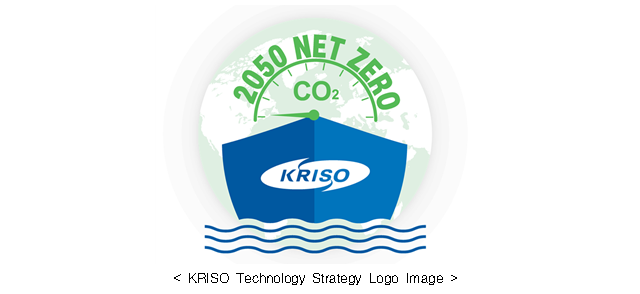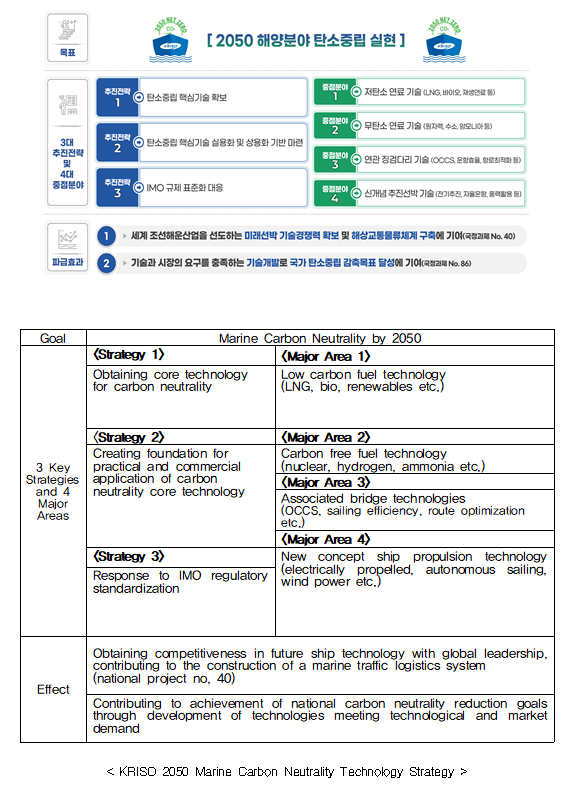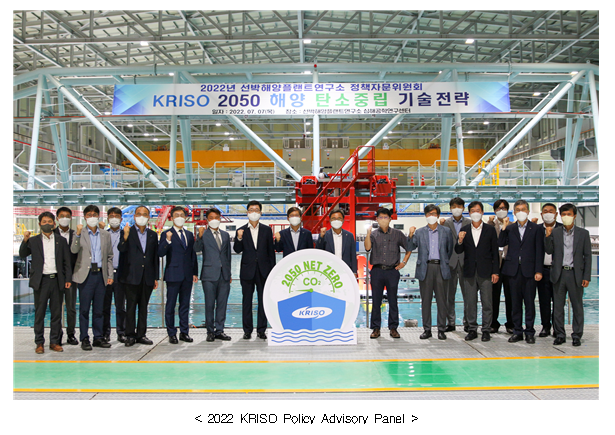KRISO Seeks to Resolve National/Societal Problems With Marine Carbon Neutrality Technology
▶ Announcement of Strategy for 2050 Marine Carbon Neutrality Technology…Leading Role in Future Developments
▶ Mission-Oriented R&D to contribute to achievement of national carbon neutrality goals
□ Korea Research Institute of Ships and Ocean engineering (hereinafter KRISO, President Booki Kim) announced on the 21st that it has received the Korea Management Registrar’s (KRM) Best of Fair Recruitment certification for the second consecutive year.
□ On July 7, KRISO announced the KRISO 2050 Marine Carbon Neutrality Technology Strategy at the KRISO Policy Advisory Committee, held at the Deep Ocean Engineering Research Center in Busan.

□ ‘KRISO 2050 Carbon Neutrality Technology Strategy’ was established with carbon neutrality becoming a global goal due to global supply chain risks in the energy sector and climate change bringing the issue of energy transition into the spotlight, as well as IMO (International Maritime Organization) regulations on carbon emissions.
□ The international community is seeking solidarity and cooperation to promote energy transition and carbon neutrality, with the Korean government also selecting national projects for the achievement of carbon neutrality and eco-friendly shipbuilding and shipping industries.
□ The Marine Carbon Neutrality Technology Strategy announced by KRISO focuses on obtaining core technologies, establishing foundations for practical and commercial application, as well as responding to IMO regulations to achieve marine carbon neutrality by 2050.

□ KRISO established low carbon fuel technology, carbon free fuel technology, associated bridge technologies, and new concept ship propulsion technology as core carbon neutrality technologies to reflect technological trends with the acceleration of Green transformation(GX) and Digital transformation(DX) .
□ It plans to contribute to achieving the goal of reducing greenhouse gas emissions by developing related core technologies such as low-carbon fuels represented by LNG, carbon-free fuels such as hydrogen and nuclear power, DNA (Data Network AI)-based route optimization, and platform-based ship technology.
□ KRISO expects to play a major role in establishing technological competitiveness for future ships and establishing a maritime transportation logistics system as well as achieving national carbon neutrality reduction goals.
□ In addition, KRISO plans to continue its mission of "technological innovation, social responsibility, and industrial support" by establishing an implementation plan for the KRISO 2050 Carbon Neutrality Technology Strategy and holding a 2050 Marine Carbon Neutrality Forum with participation from domestic industry, academia, research, and government.
□ "The world is taking steps toward carbon neutrality for sustainability and coexistence in this planet," says Boo-ki Kim, President of KRISO. "In line with the government's policy to achieve carbon neutrality, our research institute will also play a leading role in realizing carbon neutrality in the maritime sector."
□ Meanwhile, KRISO policy advisors played a large role in establishing this technology strategy. The KRISO Policy Advisory Committee, composed of various members representing industry, academia, research, and government, has been sharing the latest international regulations, government policies, and technology trends and contributed to the establishment of KRISO ESG management strategy last year.
□ Policy Advisory Committee members include President Hohwan Jeon of Tongmyong University and professor Gukjong Lee from AJOU University, professor Yonghwan Kim, of Seoul National University, Professor Jong-ho Nam of Korea Maritime & Ocean University, Professor Hacheol Song, Mokpo National University from representing academia, as well as Director Dongsun Park of the Republic of Korea Navy Future Innovation Project Team, Chairman Gyeongseok Kim of the Ship Safety Technology Authority from the government, and President Lee Hyungcheol of the Korean Register of Shipping and Vice President Won-ho Joo of Hyundai Heavy Industries from the industry.
□ Policy Advisor Joo Won-ho from Hyundai Heavy Industries said, “The preemptive preparation of a systematic technology strategy for carbon neutrality in the marine sector by a key research institute in the marine sector is significant, and we hope that the research institute will play a leading role alongside industries, universities and research institutes in Korea's marine sector.
□ All eyes are on KRISO as it prepares to lead the future of the eco-friendly marine technologies sector and present solutions for national issues based on the KRISO 2050 Marine Carbon Neutrality Technology Strategy’ and ESG management strategy.


 Research Project
{{data.S ? data.S.sum : 0}}
Research Project
{{data.S ? data.S.sum : 0}}

 Patent
{{data.P ? data.P.sum : 0}}
Patent
{{data.P ? data.P.sum : 0}}

 Technology Transfer
{{data.T ? data.T.sum : 0}}
Technology Transfer
{{data.T ? data.T.sum : 0}}

 Thesis
{{data.R ? data.R.sum : 0}}
Thesis
{{data.R ? data.R.sum : 0}}










